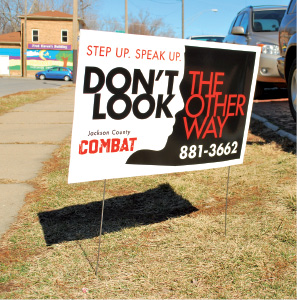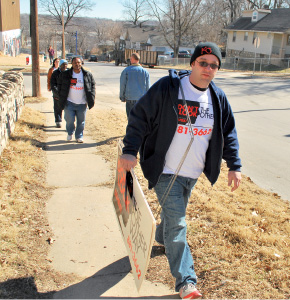
By LESLIE COLLINS
Northeast News
February 20, 2013
Don’t look the other way. That’s the message the Jackson County Community Backed Anti-Drug Tax (COMBAT) is sending to area residents.
COMBAT launched a similar anti-violence campaign in 2006 and 2007, which resulted in calls nearly doubling to the TIPS Hotline and detectives solving a number of crimes as a result of those tips, said Jackson County Executive Mike Sanders.
Asked what will set this campaign apart from previous campaigns, Sanders said this campaign will use direct outreach, like knocking on doors, yard signs and billboards to educate the public about the importance of reporting crime. Unlike previous campaigns, this will be a year-round, long-term approach, he said.
“We’ve got to do it long-term,” Sanders said. “It can’t be a flash in the pan. It’s got to be sustained throughout the years.”

COMBAT volunteers canvass a Northeast neighborhood Feb. 15 to promote the “Don’t look the other way” campaign, which encourages residents to report crime. Leslie Collins
Having a lack of witnesses step forward is an issue affecting not only Kansas City but communities across the United States, he said. Individuals are failing to report key details in crimes they witnessed, he said. Those details are what put criminals behind bars.
“There’s no magic wand, there’s no magic in the courtroom and in those convictions,” said Jackson County Prosecutor Jean Peters-Baker. “Justice comes from people who step up and people who are willing to come forward. It’s hard, but it’s worth it. It’s worth it for all of us…
“I’m not looking for snitches. I’m looking for witnesses and there’s a very big difference between the two.”
Snitches are those who played a role in the crime and witnesses are innocent bystanders who saw part of the crime, she said.
“Usually a snitch comes in the room in an orange jumpsuit,” she said.
“If you’re not involved in the crime, you’re not a snitch, and you have to remember this,” Jackson County Sheriff Mike Sharp said.
A witness knows a key piece of the puzzle in a crime investigation, Peters-Baker said. He or she may have a vehicle description or a description of the suspect.
“That little piece of the puzzle is very important to the whole collection of evidence in that case,” she said.
Peters-Baker added she believes it’s possible to lower Kansas City’s homicide and violent crime rate, but it will require the cooperation of citizens who not only step forward as witnesses but also deliver the message of COMBAT’s campaign to their neighborhoods.
“Without your assistance, we (law enforcement) can’t solve crimes unless we see it ourselves,” Sharp said. “Think about that for a second. Without your help, we can’t solve a crime. That’s a big deal. We need witnesses. It takes everyone in our community to step up and speak up, everyone.”
To jump-start the campaign, more than 100 volunteers from COMBAT agencies canvassed three neighborhoods Feb. 15 and will continue to knock on doors throughout Jackson County in the coming months. Agencies included the Mattie Rhodes Center, Sheffield Place, the Guadalupe Centers, Westside CAN Center, among others. Over the next few months, volunteers will spread the campaign’s message of “Don’t look the other way. Step up. Speak up” to approximately 50,000 households, Sanders said.
Crime doesn’t stop at municipal boundaries, which is why the message must be spread to Kansas City and its surrounding communities, Sanders said.
State Rep. John Rizzo told Northeast News he supports COMBAT’S newly launched campaign.
“Anything that is going to help curb violence and violent crime, I’m all for it,” Rizzo said. “I think this is just another tool in the progression of having a safe city. In order for the city to grow, in order for the city to become something for everybody, people have to feel safe in their homes.”
Rizzo added he’ll search for state funding to help continue this program and others that are aimed at curbing violence.
“The budget is tight right now as everybody knows, but quite honestly, I think this has got to be our No. 1 priority,” Rizzo said. “Economic development and other issues don’t even stand a chance if people don’t feel safe in their homes.”
For 18-year-old Historic Northeast resident Camila Alvarez, the campaign is personal.
A senior at Lincoln Prep, she took the day off from school to attend the Feb. 15 COMBAT press conference at the Whatsoever Community Center, 1201 Ewing Avenue, where she also volunteers. She lives up the street from the community center in a neighborhood that’s been designated as a hot spot for crime by the Kansas City Police Department.
Drug houses surround her block and every night she hears gunshots.
“It’s pretty bad,” she said. “I have younger siblings and I don’t want them to grow up in a situation where it’s okay for them to hear gunshots and just go on with their lives. Because it’s not okay to hear gunshots when you go to sleep. I want the (neighborhood) kids to be able to go outside and play and have a normal kid life without having to worry about whether they’ll come back inside shot or something.”
Asked how hearing gunshots on a regular basis has affected her, Alvarez said, “I feel like now I’ve become numb to it, which is a horrible thing to say, but it’s the truth. It happens so often, we just become numb to it. We tend to shelter our own, make sure we’re okay while doing all we can. It’s a horrible thing to have to go through. It’s scary.”
Alvarez’s family reports neighborhood crime on a regular basis and were among the first to display a “Don’t look the other way” yard sign in their front yard. COMBAT’s campaign is paramount because Kansas City’s crime rate is unacceptable, she said.
“If the community doesn’t want to get involved, it’s (campaign) not going to go anywhere,” Alvarez said. “That’s why we need to get the point across to the community and let people know it’s okay to call the cops. If you see something, say something, because it’s not going to get solved unless we start doing something about it.”














